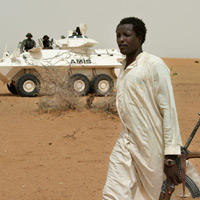
We congratulate you and welcome your appointment as mediator for the Darfur peace process. Your work is as vital as it will be challenging, and we believe that with leadership,and credible support from the international community, peace is within reach for Darfur. Equally clear without an effective peace process, Darfur’s violence will continue, and Sudan’s ultimate fragmentation will only become more likely.
Your role is one side of a triangle: Ending the catastrophe in Darfur requires not only support for a peace
process, but also international protection for civilians through rapid deployment of UNAMID and accountability for the many human rights abuses that have taken place to date.
The Security Council, previous mediators, and the parties themselves have failed to articulate a clear path to peace, and the people of Darfur have paid a terrible price for this lack of vision. It is tragic that for five years the international community has not mounted an effective peace process, despite the fact that a successful
model already exists for peacemaking in Sudan—the process that led to the 2005 Comprehensive Peace Agreement (CPA). That agreement was realized in large part because the international community demonstrated strong leadership, invested heavily in diplomacy, and applied coordinated leverage on the parties.
As the mediator, you must ensure that you are fully empowered to drive the process and be supported by a full-time team with expertise in all of the relevant issues under negotiation. The efforts of such a single, empowered mediator were crucial to the success of the negotiations that resulted in the CPA. Equally important to achieving that agreement was the support of the international community, in particular the United States, the United Kingdom, and Norway (the ‘troika’). As you press forward on a deal for Darfur, you should demand similar backing from the core group of countries with the most leverage over the parties. These include the United States, the United Kingdom, France, and China. The UN Security Council should be prepared to back your efforts with focused incentives and pressures. If those basic conditions for your success are not in place, you should duly inform the world.
LISTENING TO VOICES FROM DARFUR
Since the conflict began in early 2003, we have among us made 10 research trips to the war zone. In our travels, we have found only one group of people who have consistently articulated workable solutions to the challenges facing Darfur: the internally displaced and refugee populations. The voice of the Darfurian diaspora is also emerging. The people of Darfur have strong views about what issues need to be addressed, and how. However, Darfurians have been conspicuously absent from peace efforts, helping explain why we have seen such limited progress. You will only succeed in your endeavors if you listen to them, and it is their voices that will ultimately make any peace process sustainable.
As you undertake consultations with Darfurians, you will find that several persistent themes emerge:
•The need to share power and wealth more equitably in order to end historic marginalization, including direct efforts to increase representation of traditionally marginalized groups in government
• The need to decentralize political and fiscal decision making
• The need for victims of violence to receive adequate individual compensation and restitution
of stolen property
• The need for those driven from their homes to be able to return to their land safely and in dignity, with
the establishment of practical land ownership and rights policies that will encourage such returns
• The need to dismantle the structures of violence—in particular the Janjaweed militias—that have torn
Darfur to pieces
• The need to establish practical mechanisms for promoting reconstruction that will include local representatives,the government, and the international community
The issues on the table in Darfur are complex, with deep disparities between the positions of the government
and the rebel groups. Rather than relying solely on the warring parties to come up with their own proposals, you and your team should author a draft agreement that begins to bridge the gaps by consulting with and incorporating the perspectives of a much broader array of stakeholders, particularly the civilian victims of the conflict.
A draft agreement that lays out a clearly defined vision for an end state that resonates with Darfur’s civilian population would break the pattern of previous rounds of negotiations, in which the government and rebel groups exploited the lack of vision and stuck to intransigent positions. The people of Darfur continue to pay the price for this failure, and, for their sake, you must seize the opportunity to chart a new course.
The bottom line is this: There are solutions to the crisis in Darfur, and Darfurians should be at the center of those solutions.

